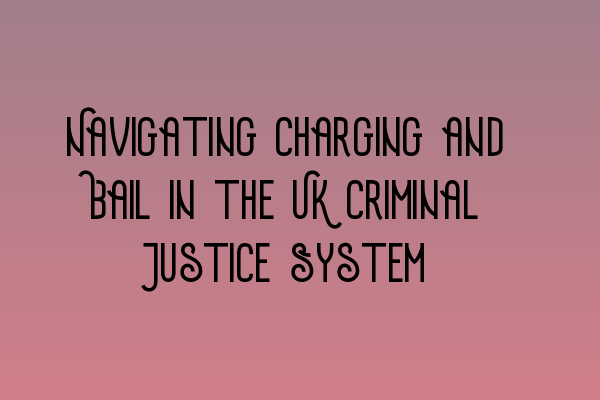Welcome to SQE Criminal Law & Practice Law UK! In today’s blog post, we will be delving into the intricate world of charging and bail in the UK criminal justice system. Navigating this aspect of the legal landscape can be overwhelming, so we’re here to break it down for you and provide some clarity.
Understanding Charging
In the UK criminal justice system, charging someone with a crime is a pivotal step in the legal process. When the police have sufficient evidence that a person has committed an offense, they can charge them. It is essential to note that charging does not imply guilt, but rather signifies that there is enough evidence to proceed with the case.
Before charging, the police must carefully evaluate the available evidence and determine whether it meets the threshold for charging. This assessment includes examining witness statements, forensic evidence, and any other relevant information.
SQE 1 Practice Exam Questions can help aspiring lawyers test their knowledge on charging and other aspects of criminal law.
The Role of Bail
Once a person is charged, the issue of bail arises. Bail refers to the release of an individual awaiting trial, subject to certain conditions. The purpose of bail is to balance the interests of justice and the rights of the accused.
The court considers several factors when deciding whether to grant bail, including the seriousness of the offense, the individual’s criminal record, their ties to the community, and the risk of flight or reoffending. In some cases, the court may impose strict conditions, such as surrendering passports, adhering to a curfew, or reporting to a police station regularly.
If you’re preparing for the SQE exams, it’s crucial to have a solid understanding of charging and bail. Practice mocks such as SQE 1 Practice Mocks FLK1 FLK2 can help you assess your knowledge and improve your performance.
Charging and Bail Procedures
The steps involved in charging and bail procedures vary depending on the nature of the offense and the jurisdiction. Generally, after charging, the police will bring the accused before a Magistrates’ Court or Crown Court for a bail hearing. During this hearing, the court will review the circumstances of the case and make a decision based on the available information.
It’s crucial for lawyers to have a thorough understanding of these procedures. Enrolling in SQE 2 Preparation Courses can equip you with the necessary knowledge and skills to navigate the complexities of criminal law.
SRA SQE Exam Dates
If you’re contemplating a career in criminal law, it’s essential to stay updated on the latest exam dates for the SRA SQE exams. These exams assess the competence and skills of aspiring solicitors.
For information about upcoming exam dates, check out this comprehensive guide on SRA SQE Exam Dates. Being aware of these dates will help you plan your preparation effectively.
In conclusion, understanding charging and bail in the UK criminal justice system is crucial for lawyers and aspiring solicitors. The process can be complex, but with the right knowledge and guidance, you can navigate it successfully.
For more information and resources on criminal law and practice, consider enrolling in our SQE 1 Preparation Courses. They are designed to equip you with the knowledge and skills necessary to excel in your legal career.
